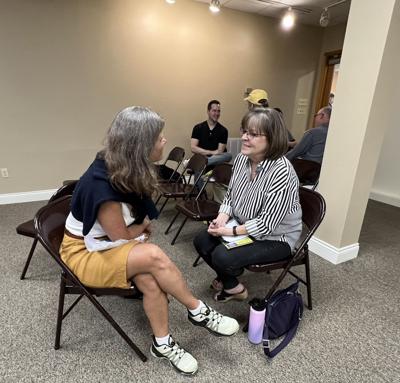In the year since the Surgeon General issued the deeply researched report on the epidemic of loneliness and isolation, I've thought a lot about possible solutions to help people who are out there struggling to connect with others.
One idea I've come up with is what I am informally calling "story circles." Every person has experienced things that make a good story. The trick is in telling that story to a listening audience — even if it's an audience of one.
Telling good stories opens a world of possibilities in connecting with others — and a connection with even one person could make all the difference.
So, what defines a good story?
In my opinion, a good story is rich in detail and, at its heart, demonstrates one's capacity for change.
We can all change and have changed.
One of my favorite quotes is credited to St. Augustine who wrote: The deepest desire of the human heart is to belong, to be welcomed, to know you are seen and worthy of kindness.
I believe telling our own stories and listening to the stories of others can help create that deep yearning for connection, acceptance and love that is part of human nature. The question is: What gets in the way of that?
Brené Brown says the answer is simple. She says it's shame, which is basically "the fear of disconnection," according to Brown.
Truth be told, I've observed many people tell the stories that end up not creating connection with others. Instead of stories that offer an honest assessment of things and expose their own vulnerabilities, they tell a different version — sometimes it's too bright and shiny version, too rote or too exaggerated.
Granted, there are still great storytellers out there who embellish and entertain, but that's a different kind of storytelling than what I'm talking about. With this kind of storytelling, as with the rest of life, being vulnerable turns out to be the key.
Sometimes when we tell our own stories we do so by bypassing that vulnerability thing. In fact, if we aren’t conscious in our storytelling, bypassing vulnerability is often our default mode. Instead, there are keys to being a better storyteller:
- Telling the truth about what happened instead of glossing over the parts in which we might not shine as brightly as we would prefer;
- Giving appropriate credit to someone else;
- Telling about the parts that didn't turn out the way we hoped.
There's a fine line between being vulnerable and oversharing — and, without question, talking too much is not the answer. However, being open and honest about our fears or insecurities helps others be more open to investing in us emotionally.
In a well organized story circle, the element of timing helps with the problem of oversharing — or one person dominating the limited time together. With a timer running, people tend to be more conscious of what they're saying. The secret: A pocket watch or phone with a loud timer.
The rules about how long one person speaks must be enforced for the story circle to work. Otherwise, trust me, one person will talk for far too long. They mean no harm. Some people simply lose themselves in the moment.
Depending on your group size, between four and eight minutes is the ideal length of time for one person to speak. The facilitator has announce the words up front and be very clear in the timing element of the storytelling circle. This process can work one on one or with a group of up to eight people.
A story circle builds on the idea that in order for connection to happen we have to allow ourselves to be seen and tell true, unrehearsed stories of our lives — and we have to listen.
Brown says that connection comes down to a sense of worthiness. I believe telling our own stories and listening to others could help people find more of a sense of worthiness — and the two-way street there is essential in the process. Taking in someone else's story helps each of us understand our own humanity.
To further paraphrase Brown, the one thing that keeps us out of connection is our fear that we’re not worthy of connection — so it’s a vicious cycle.
I believe storytelling and story circles could change that.
As Frederick Buechner said: My story is important not because it is mine, but because if I tell it anything like right, the chances are you will recognize that in many ways it is yours.

